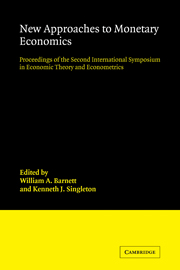 New Approaches to Monetary Economics
New Approaches to Monetary Economics Book contents
- Frontmatter
- Contents
- Editors' introduction
- List of contributors
- Part I Transactions motivated monetary holdings in general equilibrium
- Part II Financial intermediation
- 4 Preference shocks, liquidity, and central bank policy
- 5 Banking and macroeconomic equilibrium
- Part III Monetary aggregation theory
- Part IV Issues on aggregate fluctuations
- Part V Theoretical issues in the foundations of monetary economics and macroeconomics
5 - Banking and macroeconomic equilibrium
Published online by Cambridge University Press: 04 August 2010
- Frontmatter
- Contents
- Editors' introduction
- List of contributors
- Part I Transactions motivated monetary holdings in general equilibrium
- Part II Financial intermediation
- 4 Preference shocks, liquidity, and central bank policy
- 5 Banking and macroeconomic equilibrium
- Part III Monetary aggregation theory
- Part IV Issues on aggregate fluctuations
- Part V Theoretical issues in the foundations of monetary economics and macroeconomics
Summary
Introduction
The Miller–Modigliani theorem asserts that, in a setting of perfect capital markets, economic decisions do not depend on financial structure. An implication is that the addition of financial intermediaries to this type of environment has no consequence for real activity.
A number of recent papers [e.g., Bernanke (1983), Blinder and Stiglitz (1983), Boyd and Prescott (1983), Townsend (1983), and Williamson (1985)] have questioned the relevance of this proposition, even as an approximation, for macroeconomic analysis. Instead, they revive the view of Gurley and Shaw (1956), Patinkin (1961), Brainard and Tobin (1963), and others that the quality and quantity of services provided by intermediaries are important determinants of aggregate economic performance. The basic premise is that, in the absence of intermediary institutions, informational problems cause financial markets to be incomplete. By specializing in gathering information about loan projects, and by permitting pooling and risk-sharing among depositors, financial intermediaries help reduce market imperfections and improve the allocation of resources. Thus, changes in the level of financial intermediation due to monetary policy, legal restrictions, or other factors may have significant real effects on the economy. For example, Bernanke (1983) argued that the severity of the Great Depression was due in part to the loss in intermediary services suffered when the banking system collapsed in 1930–33.
The objective of this paper is to provide an additional step toward understanding the role of financial intermediaries (hereafter, simply “banks”) in aggregate economic activity.
- Type
- Chapter
- Information
- New Approaches to Monetary EconomicsProceedings of the Second International Symposium in Economic Theory and Econometrics, pp. 89 - 112Publisher: Cambridge University PressPrint publication year: 1987
- 53
- Cited by
